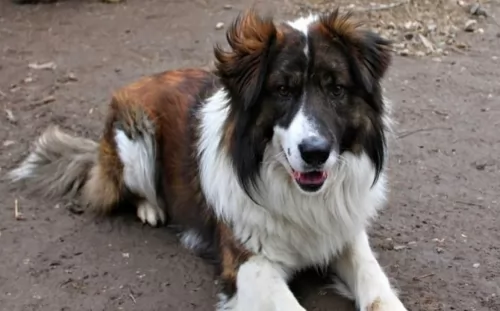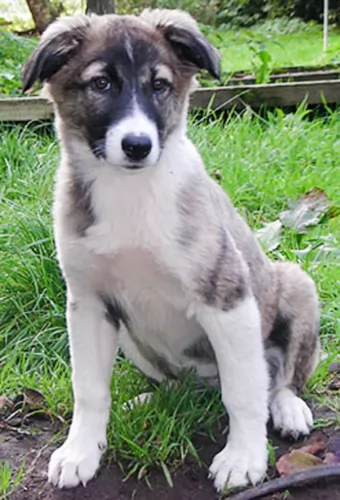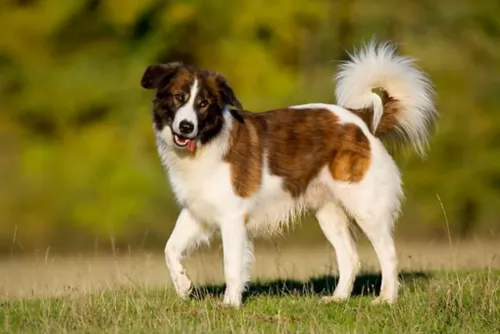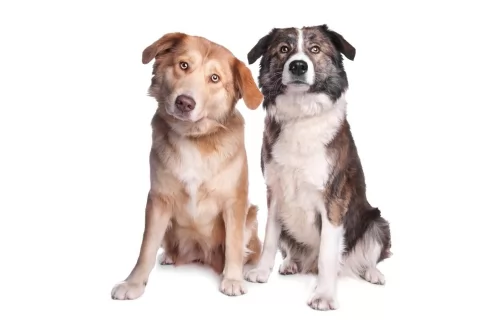 Petzlover
Petzlover Aidi is originated from Morocco but Drever is originated from Sweden. Aidi may grow 23 cm / 10 inches higher than Drever. Aidi may weigh 9 kg / 20 pounds more than Drever. Aidi may live 3 years less than Drever. Both Aidi and Drever has almost same litter size. Both Aidi and Drever requires Low Maintenance.
Aidi is originated from Morocco but Drever is originated from Sweden. Aidi may grow 23 cm / 10 inches higher than Drever. Aidi may weigh 9 kg / 20 pounds more than Drever. Aidi may live 3 years less than Drever. Both Aidi and Drever has almost same litter size. Both Aidi and Drever requires Low Maintenance.
 Aidi dog is also known as Berber dog. It originates from Marocco, where it has been kept to protect people from wild animals, strangers, and predators. It is considered that this breed has been utilized by the Barber tribe that is why it has a name Barber dog. Aidi has recently been protected by a club to keep its purity of the breed.
Aidi dog is also known as Berber dog. It originates from Marocco, where it has been kept to protect people from wild animals, strangers, and predators. It is considered that this breed has been utilized by the Barber tribe that is why it has a name Barber dog. Aidi has recently been protected by a club to keep its purity of the breed.
 The Drever dog hails from Sweden, being brought from Germany to the Scandinavian country in 1910. As a scenthound, in spite of his short legs, he was once used for hunting purposes, having a keen nose.
The Drever dog hails from Sweden, being brought from Germany to the Scandinavian country in 1910. As a scenthound, in spite of his short legs, he was once used for hunting purposes, having a keen nose.
The dog was developed from the Westphalian Dachsbracke and then crossbred with other Swedish hounds.
By the 1940s there were two distinctive sizes of this Dachsbracke dog and the larger one was named Drever. It was in 1947 that the Drever was then recognized by the Swedish Kennel Club as a separate breed. It was also recognized by a number of other clubs and registries.
 Aidi dog originate country is Morocco.
A weight of the Aidi dog is 23-25kg while the height is 53-61cm. Female dogs are a little smaller than average males.
Lifespan variates from 10-12 years, but it depends on every individual.
Litter Size of Aidi is 5-8 puppies.
Other Names for Aïdi are Atlas Mountain Dog, Atlas Shepherd Dog, Berber Dog, Chien de l'Atlas, Chien de Montagne de l'Atlas, Kabyle Dog.
Aidi dog originate country is Morocco.
A weight of the Aidi dog is 23-25kg while the height is 53-61cm. Female dogs are a little smaller than average males.
Lifespan variates from 10-12 years, but it depends on every individual.
Litter Size of Aidi is 5-8 puppies.
Other Names for Aïdi are Atlas Mountain Dog, Atlas Shepherd Dog, Berber Dog, Chien de l'Atlas, Chien de Montagne de l'Atlas, Kabyle Dog.
 Looking quite similar to the Beagle, the Drever is a medium sized dog which stands at about 32 – 38cm and weighing between 14 and 16kg.
Looking quite similar to the Beagle, the Drever is a medium sized dog which stands at about 32 – 38cm and weighing between 14 and 16kg.
He has a fairly long body but unlike the Dachshund his short legs are straight and aren’t bent. The nose of the dog is fairly large and black and the ears are quite long, much like a Beagle dog.
The eyes are bright, alert and dark and the expression on the dog’s face is amicable and gentle.
He has a short, dense coat and is looked upon as a moderate to heavy shedder. The coat can be in several colors such as brown or tan and black with white markings over the face, neck, chest and feet. He has floppy ears and a long tail carried downwards.
 Aidi is an active dog who loves spending time outside in large space. They are not recommended for people who live in the apartments. They are very protective dogs, so they will be a perfect guard dog for large houses.
Aidi is an active dog who loves spending time outside in large space. They are not recommended for people who live in the apartments. They are very protective dogs, so they will be a perfect guard dog for large houses.
They are amazing with children. Aidi is a very gentle to small kids, and they tend to bond very quickly. It is very important to socialize them on time because they tend to be aggressive towards other animals and people if not properly trained. The best way to socialize them is to spend time with other pets since the early age.
Training of the Aidi might be tricky because it requires constancy and patience. It is also very important to be a firm but without any aggression towards a dog. Awarding and positive training is a must with this breed.
One of the most important things is that Aidi needs to spend a lot of time being active. They need a lot of space to be comfortable even though they do not need a lot of running.
They are very smart dogs who come from a history of guarding dogs, so proper socialization is a must. Aidi is not recommendable for the first time owners. They need a lot of practice and training to be a perfectly good pet.
 The Drever dog is an easy dog to have around, not requiring any special treatment to keep him happy.
The Drever dog is an easy dog to have around, not requiring any special treatment to keep him happy.
He gets on well with every member of the family as well as any pets in the home and fits easily into city- or country life.
He is an active dog however, and will require exercising to avoid him becoming frustrated.
Treat your amicable Drever with the attention he deserves and you’ll have a friendly, calm and devoted pet who wants to be your best friend.
 The Drever is a dog which enjoys good health generally, and with good care he can reach 12 to 15 years of age. The Drever, similar to other dogs, may be susceptible to some common health concerns that any healthy dog can experience such as back pain, hip dysplasia, eye diseases, obesity, diabetes and others.
The Drever is a dog which enjoys good health generally, and with good care he can reach 12 to 15 years of age. The Drever, similar to other dogs, may be susceptible to some common health concerns that any healthy dog can experience such as back pain, hip dysplasia, eye diseases, obesity, diabetes and others.
Veterinary care is an important part of a dog’s health – from puppyhood to the senior years. However, the frequency of visits you make to your vet with your adult dog will depend on his health.
 Feeding Aidi dog depends on the activity and size of each individual. Overall, for a medium-sized dog with average activity 2-2.5 cups of high-quality food would be enough, but if your dog is a very active dog, you should give him extra food. They love eating, so giving your dog healthy fruit and vegetables would be a very nice treat and addition to dry food. Olive oil is also very good for your dog’s coat and digestive system.
Feeding Aidi dog depends on the activity and size of each individual. Overall, for a medium-sized dog with average activity 2-2.5 cups of high-quality food would be enough, but if your dog is a very active dog, you should give him extra food. They love eating, so giving your dog healthy fruit and vegetables would be a very nice treat and addition to dry food. Olive oil is also very good for your dog’s coat and digestive system.
Puppies need to have more meals per day, so dividing 3-4 cups of food into 3-5 meals per day should be a good amount of food for your puppy. Also, regular intake of vitamins and minerals would do a lot of benefits for the health of your dog.
Aida is a very easy dog for grooming. They have a coat that really needs a little extra attention. Few brushing on a monthly basis with an occasional bathing couple of times a year would be enough to have a perfectly groomed dog. They don’t shed a lot, so little extra brushing during the shed period is all you need.
 It is important to feed your dog food that will cater to his digestion. That is why some of the best commercially manufactured foods are so good – they cater specifically for a dog’s age, his size, his activity levels and for any illnesses he may have.
It is important to feed your dog food that will cater to his digestion. That is why some of the best commercially manufactured foods are so good – they cater specifically for a dog’s age, his size, his activity levels and for any illnesses he may have.
In terms of activity levels, the Drever is an active dog, quite capable of chasing prey for long distances without tiring. This is why some dog foods are breed- and activity specific.
A good brand of kibble mixed with some cooked brown rice, vegetables and chicken will be excellent for your pet. Remember, if at all possible, to include some raw meat into the diet from time to time. Cool, fresh water should be available at all times.
Maintaining your Drever’s short, coarse coat won’t be a hassle, and you can call him a low maintenance dog. All that is essentially required is for you to give his coat a good brush twice a week. Nails will also need to be checked as well as his ears. Ignoring his ears can lead to wax build up and dirt and this can result in infection.